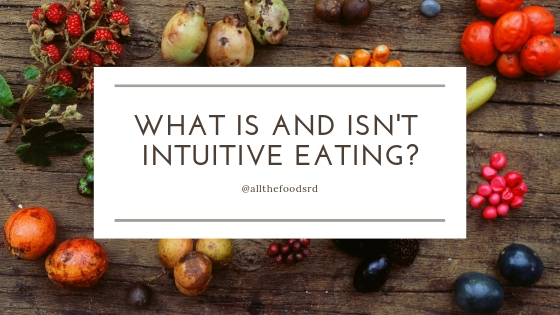Intuitive eating.
Intuitive Eating is an evidenced-based, mind-body health approach, comprised of 10 principles (we’ll get to those soon) and created by two dietitians, Evelyn Tribole and Elyse Resch in 1995. It is a weight-neutral model with a validated assessment scale and over 90 studies to date. It is a personal process of honoring health by listening and responding to the direct messages of the body in order to meet your physical and psychological needs. (source: intuitive eating.org)

A common misconception from people that are not familiar with intuitive eating is that it is all about eating when you are hungry and stopping when you are full. Intuitive eating is not the “hunger fullness diet”. When it is looked at in this way it creates a diet mindset filled with rules.
There is so much black and white thinking when it comes to food. We are always all in or all out. I think that has become the case with intuitive eating for some people. When you are new to intuitive eating it can be easy to continue with the diet mindset from your past. The dieting mindset can lead you to want to make sure you are doing it right or perfectly. Well there is actually no perfect with intuitive eating and there is a lot of room for mistakes.
It is okay to eat when you aren’t hungry. There are plenty of instances where if working on intuitive eating you would eat when you aren’t physically hungry. One of those is if you know you will be going into meetings the rest of the day and won’t have another break for lunch. That means it is time to eat whether you are feeling hunger or not. Intuitive eating includes using body knowledge as well as head knowledge. Body knowledge meaning hunger cues and head knowledge having the nutrition information to know that you need food several times per day, approximately every 3-4 hours. Another instance is when you are craving a cookie after dinner. You ate dinner so you aren’t physically hungry. However, you are not quite satisfied and want a cookie. Eating the cookie would be totally appropriate and enjoyable in intuitive eating.
Intuitive eating is a practice and it takes a lot of time to master. It also requires giving yourself a lot of grace. This means forgiving yourself with food mistakes and being flexible. With time and patience you will be able to surrender food rules and control and learn to trust your body and yourself!

Here are the 10 principles to intuitive eating. Follow along in my upcoming blog posts where we will continue talking about all of the principles and how to start incorporating them into your life!
10 Principles of Intuitive Eating
1. Reject the diet mentality
2. Honor your hunger
3. Make peace with food
4. Challenge the food police
5. Respect your fullness
6. Discover the satisfaction factor
7. Honor your feelings without using food
8. Respect your body
9. Exercise – feel the difference
10. Honor your health
If you are interested in learning more about intuitive eating and how it could benefit you, I would love to hear from you!
Source: www.intuitiveeating.org









